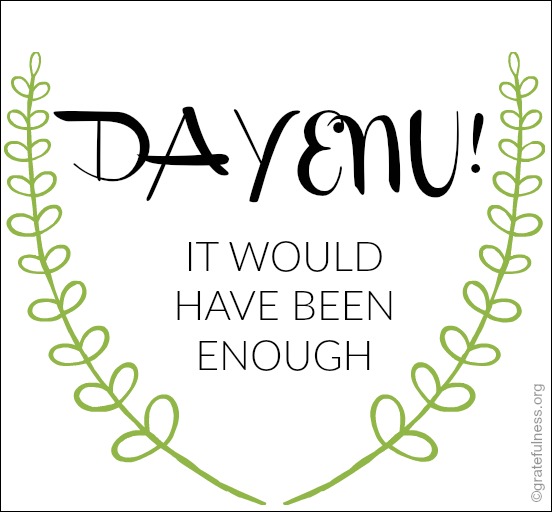The Jewish concept of thankfulness is rooted in the feelings expressed by the signature song of Passover: “Dayenu (Enough).”

The Jewish concept of thankfulness is rooted in the feelings expressed by the signature song of Passover: Dayenu, Enough. Gratitude is incremental: If God had only done this one thing, it would have been enough. If only these miracles had occurred and not others, it would have been enough, Dayenu.
Being grateful is a clear path to grace and ultimately, to happiness. If we are always searching for the next thing, if we don’t stop to appreciate what we already have, how can we know happiness and gratitude? I’ve come to understand this as a way to stop the rush to acquire and take time to just be in the moment. Happiness and gratitude require time to explore and absorb.
A good life entails finding meaning and purpose.
Passover arrives six months after the redemption and renewal of Yom Kippur, the Day of Atonement. It is a reminder of the promises we made: to try harder to be better. The lessons of chametz (leavened bread) and matza (unleavened) are these: we have forgotten what we pledged. The fast of the fall has become hollow. We, like the yeasts of chametz, have risen—our image of ourselves is inflated. The seder (the traditional Passover meal, or order of the meal) and matza are here to remind us, to remind me, that a year has passed: How have I changed this year, and now, at the half-way mark since Yom Kippur, where am I? What work do I have yet to do? We need to, if not endure the deprivation, feel the fast. The deflation of our egos as we imagine ourselves slaves serves as a potent and empathetic awakening: do the work.
A good life entails finding meaning and purpose. The writer Victor Frankl eloquently wrote about the need to pursue meaning in our lives. I want to ask: In our daily lives, do we include civility and grace in this pursuit? Today’s social media networks allow us to reach out to others, to search for “friends” in an effort to create community and fellowship. But are we truly feeling that community? Are we grateful for what we already have or ignoring the present for some elusive future?
Being a mensch is living up to our own expectations of ourselves.
With our thanks to Jan Schwartz/JewishBoston.com.
